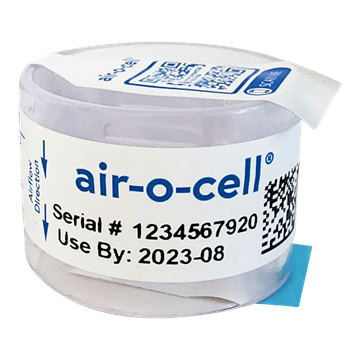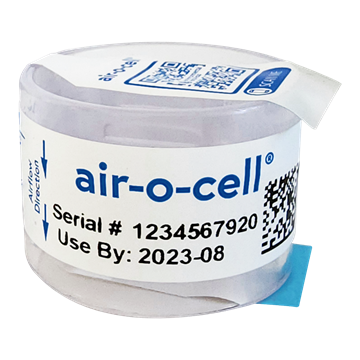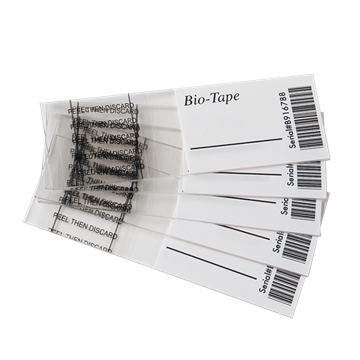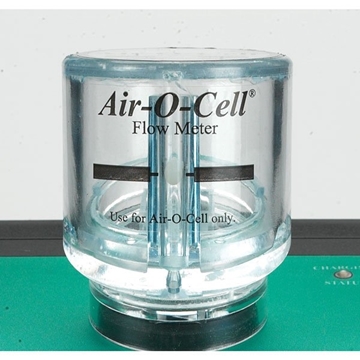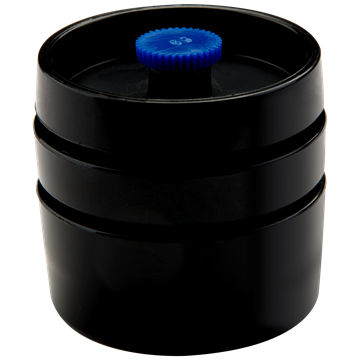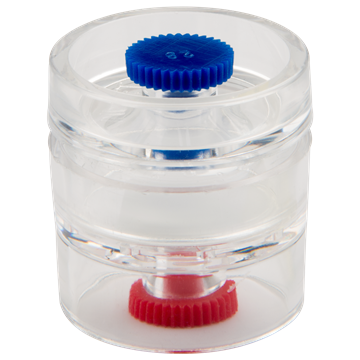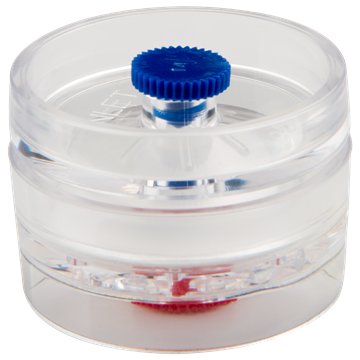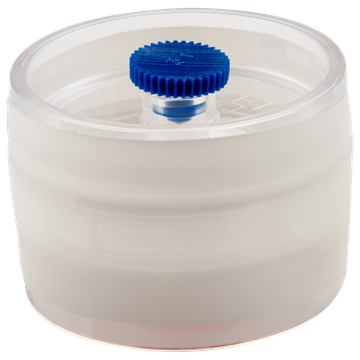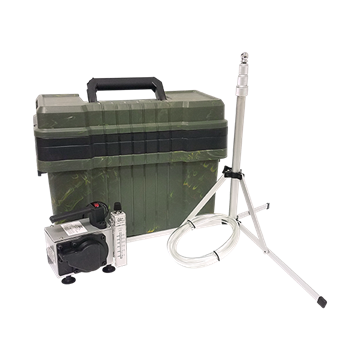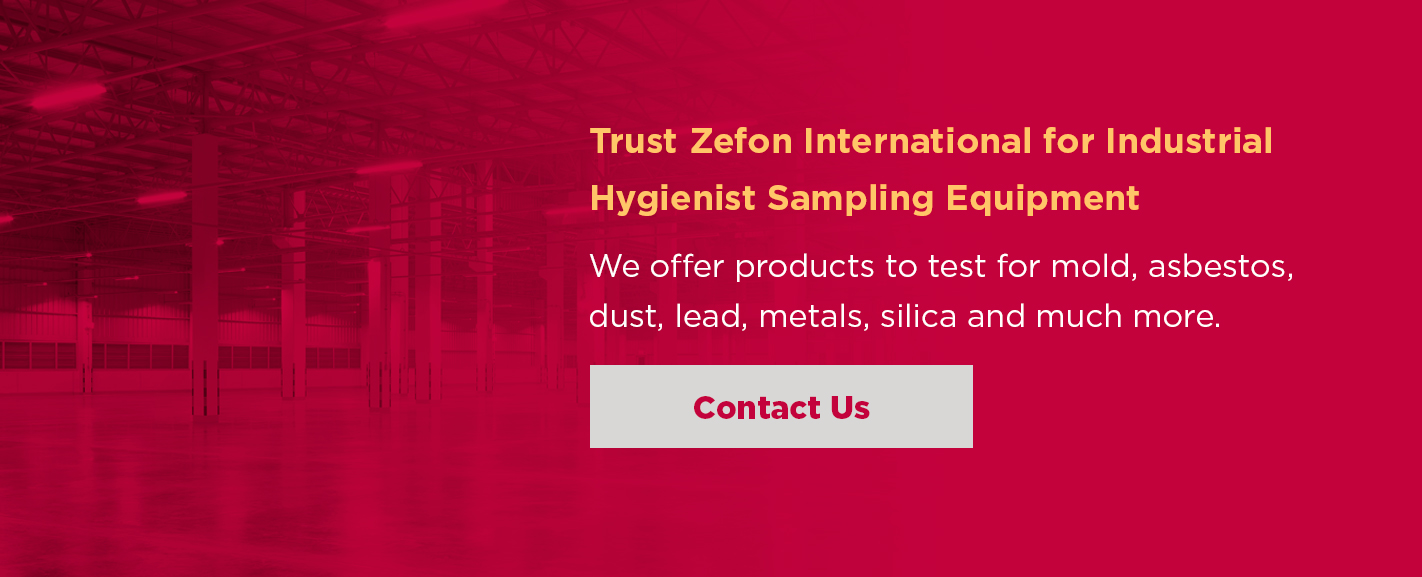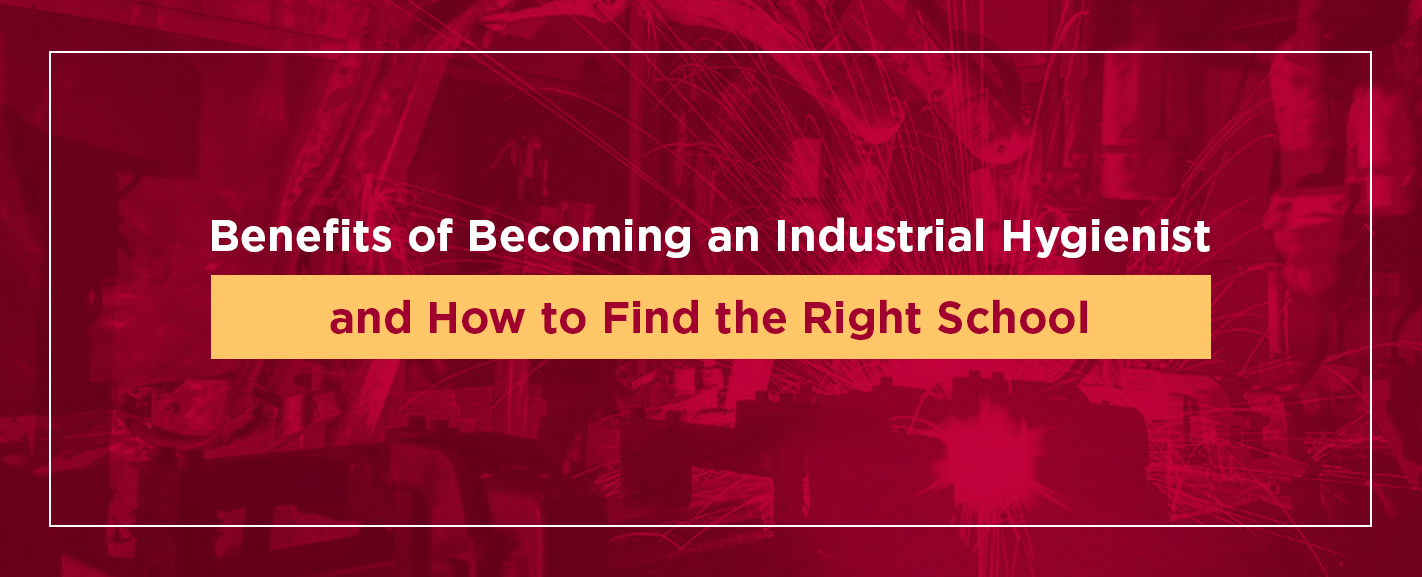
Did you know that humans have known about industrial hygiene since the fourth century B.C. when Hippocrates observed lead toxicity in the mining industry? Since ancient times, scientists have striven to protect workers and the community from hazards in the workplace and surrounding environment. When Congress passed the Federal Metal and Nonmetallic Mine Safety Act of 1966, the Federal Coal Mine Health and Safety Act of 1969, and the Occupational Safety and Health Act of 1970, industrial hygiene became an established field. Now, almost every employer in the United States is required to implement industrial hygiene and safety practices.
If you're passionate about workplace safety and are interested in pursuing a career in industrial hygiene, you'll find there are many benefits to this rewarding career. You will also discover you have plenty of options for obtaining the education and experience required to become a professional industrial hygienist.
Table of Contents
- What Is the Role of an Industrial Hygienist?
- What Are the Benefits of Becoming an Industrial Hygienist?
- What Is the Future of Industrial Hygiene?
- What Degree Do I Need to Become an Industrial Hygienist?
- What Industrial Hygienist Courses Do I Need to Take?
- What Does Industrial Hygienist Training Entail?
- How Do I Get an Industrial Hygienist Certification?
- How Do I Find a School for Industrial Hygienists?
- What Schools Have an Industrial Hygienist Program?
- Can I Be an Industrial Hygiene Consultant?
- Trust Zefon International for Industrial Hygienist Sampling Equipment
What Are the Benefits of Becoming an Industrial Hygienist?
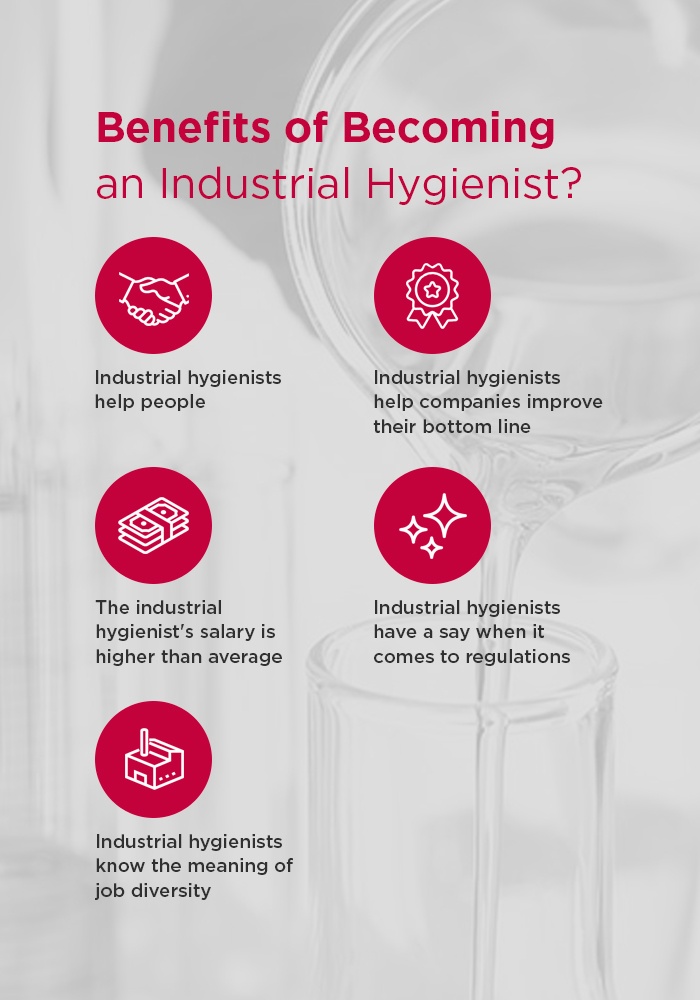
A career in industrial hygiene has many rewards. Some of the benefits of being an industrial hygienist include:
- Industrial hygienists help people: Industrial hygienists work to improve the health and life expectancy of workers as well as the health of the community. As an industrial hygienist, you can feel proud at the end of the day, knowing your work made a positive impact.
- Industrial hygienists help companies improve their bottom line: Industrial hygienists help prevent the number of workers who leave work due to illness or injury. When workers stay, employers do not have to pay the price of replacing employees. Industrial hygienists also encourage companies to adopt safer, more efficient technology. This also aids productivity and helps companies be more successful.
- The industrial hygienist's salary is higher than average: According to the Bureau of Labor Statistics (BLS), occupational health and safety specialists had a median annual wage of $73,020 in 2018. By contrast, the median earnings of America's full-time workers are about $900 a week, or less than $45,000 a year. With a decent paycheck, you can enjoy your time off and accomplish personal goals.
- Industrial hygienists have a say when it comes to regulations: Industrial hygienists make a difference by defining regulations that affect workers of the present and the future. Consider that the Occupational Safety and Health Administration (OSHA) sets mandatory regulations for over 6 million workplaces in the United States. More than 40% of OSHA compliance officers are industrial hygienists.
- Industrial hygienists know the meaning of job diversity: Industrial hygienists have many options when it comes to the type of industry they work in. They are employed by a variety of organizations, from insurance companies to hazardous waste companies.
What Is the Role of an Industrial Hygienist?
Industrial hygienists are engineers and scientists who are devoted to "protecting the health and safety" of those in the workplace and surrounding community, as defined by the American Industrial Hygiene Association (AIHA). These scientists work behind the scenes to keep people safe from hazards such as asbestos, pesticides, radiation and countless other toxins.
For example, industrial hygienists work to protect individuals from risks associated with formaldehyde exposure. Formaldehyde is a colorless highly toxic gas that is used in many industries, from plastics manufacturing to beauty products. Exposure to formaldehyde can be harmful to workers depending on the dose, the duration and the work being done. An industrial hygienist takes samples of the air and analyzes the air for contaminants like formaldehyde so steps can be taken to reduce workplace hazards. Industrial hygienists also play an important part in making sure that companies comply with federal, state and local laws to keep workers and their families safe. Overall, an industrial hygienist:
- Examines the workplace for hazards and potential hazards, which may include toxic chemicals, air contaminants, and biological and physical hazards
- Recommends ways to improve the safety of workers and the community
- Conducts scientific testing to determine the condition of the workplace
- Develops methods to eliminate hazards and control potential dangers
- Educates workers and the community about workplace risks
- Helps government officials develop regulations to protect the health of workers and the community
- Makes sure workers follow safety procedures
An industrial hygienist may fulfill the role of scientist, engineer and safety inspector wherever workplace safety is needed. They are also called occupational health and safety specialists.
What Is the Future of Industrial Hygiene?
While many workplace hazards of the past still exist, such as asbestos and lead, today's industrial hygienists must prepare for health risks that may come with new technologies.
To be successful in the future, industrial hygienists must continually learn and evolve with technology. This includes developing new sciences and practices to keep up with companies who use advanced technology and who manufacture new products. In general, industrial hygienists must take a proactive approach to promote health and safety. As long as industrial hygienists evolve with technological advancements in the workplace, their future remains bright.
What Degree Do I Need to Become an Industrial Hygienist?
An industrial hygienist needs at least a bachelor's degree to get a job in the field. Some positions require a master's degree. Here's an overview of the steps you need to take to become an industrial hygienist:
- Obtain a bachelor's degree: The first step to becoming an industrial hygienist is to get a bachelor's degree in occupational health, chemistry, engineering, physics, biology or another related science degree. Some schools offer bachelor degree programs in industrial hygiene or occupational health and safety. If you plan on becoming certified, check the coursework requirements with the American Board of Industrial Hygiene (ABIH) to ensure you take the right classes in college.
- Finish on-the-job training: After earning a bachelor's degree, you need to gain real-world experience working as an industrial hygienist and learn the applicable laws and methods of the workplace. According to the AIHA, a professional industrial hygienist is someone who has a bachelor's degree in a closely related science and a minimum of three years of industrial hygiene experience. A doctorate in a related field can be used as a substitute for two of the three years, and a master's degree can be a substitute for one year of the three-year requirement.
- Become a Certified Industrial Hygienist (CIH): The AIHA urges industrial hygienists to earn a certification through the ABIH after gaining a degree and work experience. To become a CIH, you will need a bachelor's degree, specific industrial hygienist coursework under your belt, at least four years of industrial hygiene practice, and at least two professional references. You will need to recertify every five years to maintain your certification.
- Consider a master's degree: If you wish to advance your career or fill a leadership role, you may need to earn a master's degree. A master's degree in industrial hygiene, public health or occupational health sciences will make you eligible for higher-level positions.
What Industrial Hygienist Courses Do I Need to Take?
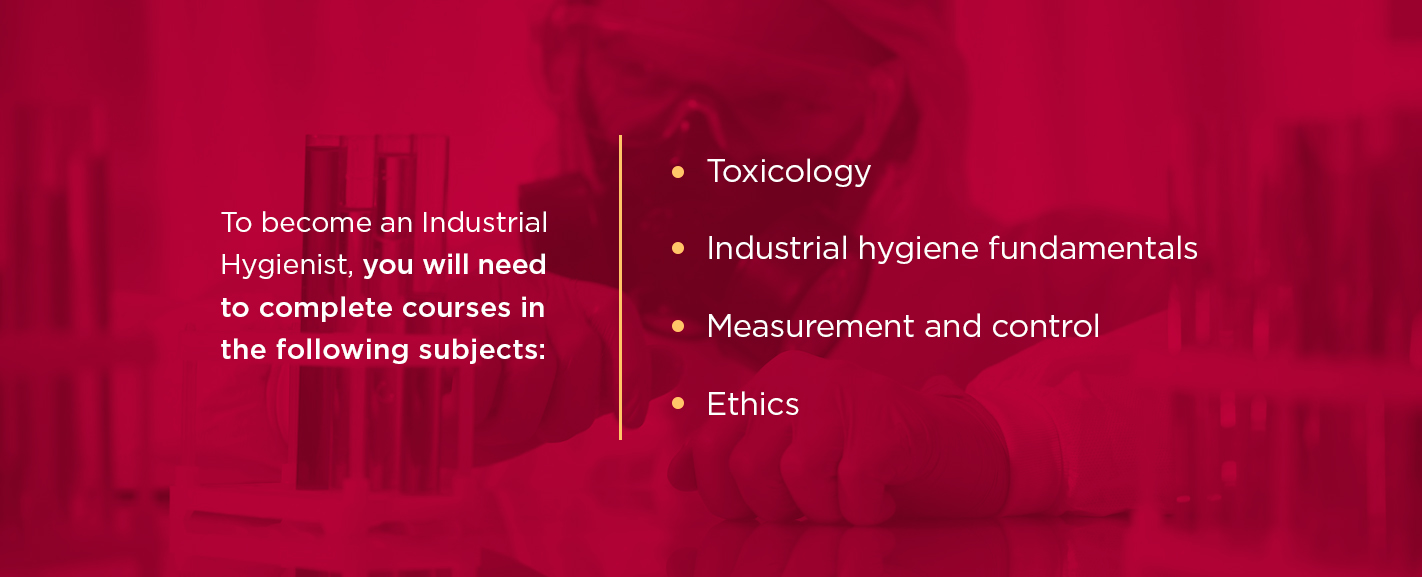
If your goal is to become a CIH through the ABIH, you'll need to complete the required coursework while obtaining your bachelor's degree at an accredited university or college. You will need to complete courses in the following subjects:
- Toxicology: Plan to complete toxicology courses that cover the adverse effects of chemicals on humans.
- Industrial hygiene fundamentals: You will need to take courses that cover topics such as hazards and stressors found in the workplace, including chemical, physical and biological hazards.
- Measurement and control: You will need to complete courses that address the fundamentals of measurement and control methods. Topics covered may include engineering, administration and personal protective equipment (PPE).
- Ethics: Lastly, you'll need to complete courses in ethics, which may cover topics such as business conflicts, workplace relationships or confidentiality of sensitive information.
If you miss any of the required courses in college, you can complete continuing education courses to meet the requirements for certification. If you complete an industrial hygiene bachelor's or master's program, you can send your transcripts to the ABIH to prove you've completed the necessary coursework. Make sure your transcripts include two hours of ethics coursework, even with a bachelor's or master's degree.
What Does Industrial Hygienist Training Entail?
The nature of industrial hygienist training depends on the industry and company in which you work. The majority of industrial hygienists work for federal, state or local governments. Industrial hygienists also commonly work in the manufacturing and construction industries. Training will be specific to your workplace. For example, your training will be much different if you work in an office than if you work in a factory.
Regardless of where you work, you can expect to be trained by an experienced professional. Your supervisor will teach you the techniques and skills required to fulfill your position successfully. If your role is complex, supervision may last up to a year.
As an example, consider the four-day Fundamentals of Industrial Hygiene course offered by the National Safety Council (NSC). This course, designed for safety and health personnel with limited training or experience in industrial hygiene, teaches the following:
- How to conduct analyses to determine industrial hygiene needs
- How to distinguish chemical, physical, biological and ergonomic hazards
- Basic toxicology
- Hazard evaluation techniques
- Emerging trends in workplace hazards
- How to use monitoring equipment
You can expect similar training topics early in your career once you're hired as an industrial hygienist. As a CIH, you will need to continue learning about industry trends and new monitoring and testing methods to maintain your certification and evolve with the times.
How Do I Get an Industrial Hygienist Certification?
To become certified by the ABIH, you must satisfy their education, experience and other eligibility requirements. You must then pass the Comprehensive Practice exam, which is based on actual experience. You will need to take the following steps:
- Review the requirements and determine your eligibility
- Complete an application, which requires education transcripts, two professional references and a $150 fee
- Once approved, schedule and take the exam, which requires a fee of $350
How Do I Find a School for Industrial Hygienists?
There are plenty of ways to search for schools online and find the right college for you, which depends on factors such as your location and financial needs. U.S. News & World Report recommends the following websites to search for colleges and to check facts on different schools:
- College Navigator
- College Insight
- College Board
- Unigo
An excellent resource for finding schools that offer industrial hygienist programs is the ABIH's website. Remember, industrial hygienist programs may also be listed under occupational health and safety specialists or inspectors.
What Schools Have an Industrial Hygienist Program?
According to the ABIH, the following schools offer bachelor's level programs accredited by the Accreditation Board for Engineering Technology (ABET):
- Purdue University
- Utah State University
- University of North Alabama
- University of Houston-Clear Lake
If you want to get your master's in industrial hygiene, you have plenty of options. Here are a few ABET-accredited schools offering master's degrees in industrial hygiene:
- Colorado State University
- Johns Hopkins University
- Purdue University
- Tulane University
- University of Arizona
- University of Central Missouri
- University of Iowa
- University of Michigan
- University of Cincinnati
- University of Oklahoma Health Sciences Center
- University of South Florida
- University of Utah
- University of Toledo
- West Virginia University
Visit abih.org for the complete list.
Can I Be an Industrial Hygiene Consultant?
Although many industrial hygienists work for government agencies or corporations, the fastest-growing sector of the field is consulting. As an industrial hygienist consultant, you would fill the same role as an industrial hygienist who works for the government, for example, except you would either work for a consulting firm or be self-employed with your own consulting business.
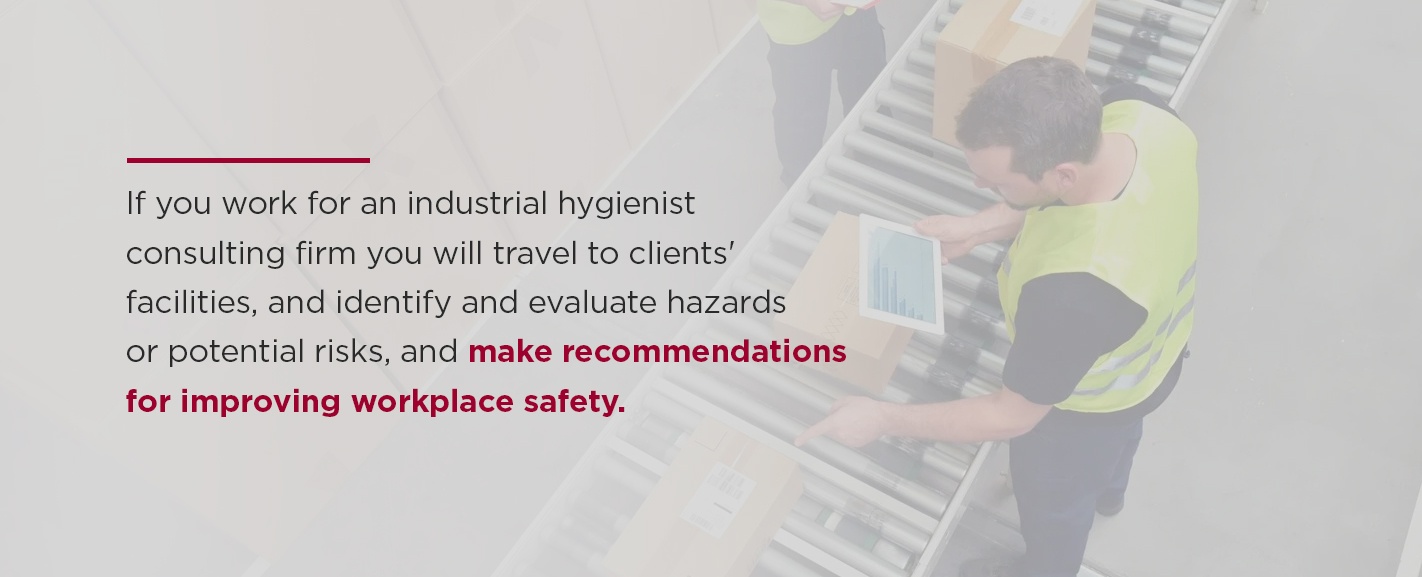
For example, if you work for an industrial hygienist consulting firm, you will travel to clients' facilities, which may range from colleges to warehouses, and identify and evaluate hazards or potential risks, and make recommendations for improving workplace safety.
Trust Zefon International for Industrial Hygienist Sampling Equipment
Industrial hygienists help protect workers and the community from dangerous toxins and hazards in the environment, but they do not complete their work alone. To offer their knowledge and services, they must use the best tools and testing methods available. If you plan on pursuing a career in industrial hygiene, whether you wish to work for a company or start your own consulting business, you need a trustworthy supplier of high-quality sampling equipment. That's what we're here for at Zefon International.
Zefon International is one of the largest manufacturers and distributors of air sampling equipment in the world. We offer products to test for mold, asbestos, dust, lead, metals, silica and much more. We are committed to superior quality, exceptional customer service, on-time delivery and competitive pricing, which is why we've been a partner with air experts since 1990. To learn more about our industrial hygienist products, contact a Zefon Sales Representative today!
























